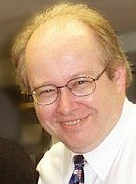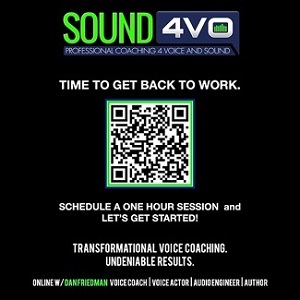|
Bob Souer Interview / Part 3
Lessons Learned: Voicing the Bible - A 774,000-Word Endurance Run
By John Florian
©2008 VoiceOverXtra LLC
 In the earlier parts of our wide-ranging interview with popular voice actor Bob Souer weíve enjoyed character-building stories from Bobís radio days (Part 1), and his unique outlook on how to achieve voice-over success (Part 2). In the earlier parts of our wide-ranging interview with popular voice actor Bob Souer weíve enjoyed character-building stories from Bobís radio days (Part 1), and his unique outlook on how to achieve voice-over success (Part 2). Now in this final installment, Bob shares how he paced himself through an almost year-long project of truly biblical proportions - voicing the Bible.
Recently completed for Thomas Nelson Publishers, the job taught Bob more valuable lessons Ö
VOXtra: Bob, could you explain the scope of this project?
Sure, it was to voice the entire Bible in the New King James translation, which is the translation published by Thomas Nelson.
We finished reading the entire text of the scriptures in late spring, and just recently completed the rereading of some verses and a bunch of pickups.
There were some 774,000 words in the project, and you canít read that many without making at least a few mistakes. Well, maybe you could, but I definitely couldnít.
You say ďweĒ Ė implying you worked with an audio engineer. In their studio?
Just like any other project, I did every word of it in my own home studio, and communicated by ISDN with the folks in Nashville who did all of the recording and editing. This obviously amounted to quite a lot of ISDN call charges, but as opposed to the alternative of flying me to Nashville for several weeks, it actually was more cost effective this way.
How did those ISDN charges work?
There is a subscription fee for ISDN, which you pay to your phone company and that varies from place to place. Here in Charlotte, North Carolina where I live itís a little over $100 a month. I do enough sessions, mostly commercials and narrations - aside from the Bible project Ė to make the $100 a month investment well worthwhile.
For the Nashville studio, in the case of the Bible project, there were long distance charges, as well. The same is true for other studios and production companies that work with me, since nearly all of my ISDN work is for clients who work somewhere else.
Bob, when did you begin voicing this project?
In late August 2007. And how did this fit into your schedule?
We had a couple of stretches off because of the time needed to edit recordings along the way. So there were a few weeks where we didnít record. But when we recorded, most days I would come home a few minutes before 4 p.m. from the Billy Graham Evangelistic Association office, where I am senior producer for radio. Nashville is on Central time, so itís a little bit before 3 pm. there.
Starting at 4 p.m. Eastern, we would record for between 45 and 55 minutes an hour, and take a short break of 5 to 15 minutes per hour depending upon how grueling the sessions were.
And we would work this way for four hours.
Four hours, five days a week?
Yes, five days a week Ė plus six to eight hours on Saturdays, usually with an hour off for lunch in the middle. So that was six days a week, four hours a day for five days, and then six to eight hours on the sixth day. And that was in addition to working 40-plus hours a week for the Billy Graham Association.
And by the way, after I finished the sessions for the Bible project, I would usually have another hour or two - and sometimes more - in my studio, finishing up projects for other clients.
Whew. How did you manage all that? Was it tremendously stressful?
I just got a lot less sleep than I normally do. I was averaging about four hours of sleep a night. I would try to get home from work early enough to get a nap for 20 minutes or so before I started recording for the Bible project.
And, honestly, on the days when I was particularly tired and they would give me the 15-minute break, I would - I actually have a couch for clients here in my home studio - lay down and sleep for 12 of those 15 minutes and then get up and go back to work.
But how did you get your mind refreshed and working so quickly again?
I donít know how to explain it, but when I wake up, bang, Iím wide awake, ready to go. And because I was only sleeping for 12 minutes, my voice didnít get seriously affected by sleep. You know how when you first wake up in the morning after a night of sleep your voice tends to be a little froggy? That wasnít an issue for me in the afternoons because I only slept for 10 or 12 minutes. It was enough to refresh me.
How did you care for your voice and keep it in tune for all this work Ė and for such a length of time?
I can only say thatís literally a gift from God. I just have a very resilient voice and one that has a lot of endurance to it because, I did not have a sniffle the entire time I was recording.
Amazing.
But after we were done recording I got the flu something crazy for about two weeks. I donít know if that was the result of stress or if I just had built all of this up. But I did get pretty sick for a little while.
Maybe it was a release from everything.
It perhaps was, indeed.
Now, script-wise - how did you approach the Bible? Did you start at the beginning and go from Genesis straight to the end, or Ö
There was a difficulty at the start with pronunciations - particularly in the first half of the Old Testament, which is filled with genealogies and place names and all of these obscure ancient names that havenít been used in centuries except for when people read the Bible.
So we started at The Psalms and went from there to the end of the Old Testament because we didnít have all of the official pronunciations from Thomas Nelson at that point.
And then an audio resource was delivered to help us pronounce all the names right. At about that time we went back to the beginning and started from there to the end of Job.
What was that resource?
There is an audio pronunciation guide for every name and place in the Bible! I never had it in my studio - the producer just played me the pronunciations down the ISDN line. That audio would have been quite a voice-over job itself.
Yes, but that guy only had to say each name once. In many cases I had to say them as many as 100 times because the names kept coming up.
And those stories - were you telling them dramatically? What was your mindset?
What I tried to concentrate on was simply to tell the story.
For example, when we got to the part in First Samuel involving David and Goliath, I didnít try to go into any sort of Sunday School teacher approach to telling that story. I just tried to tell the story as much as possible in a consistent way, matching the tone or feel of the passage.
So for instance, when you are reading in The Psalms, some of them are very upbeat and joyful. Yet others are full of dire condemnations. So I tried to match the emotional tone or mood of what was going on with my storytelling style. I just told the stories.
Would you make some differentiation between characters as you spoke the lines?
Not as you would do with an audiobook, where you create characters for each. No, I didnít try to do that.
Honestly, there is not much dialogue in the Bible.
But there are certain places - like in Job - where God is speaking to Job. There I did adopt a slightly different tone of voice with the narrative style when I was reading the parts where God is speaking, and where Job is speaking.
Other than that, I did very little of what we would call character separation.
As you probably know, one of 2008 Audie winners was another Bible project - Inspired By Ö The Bible Experienceô: Old Testament. It was read by a number of celebrities - Angela Bassett, Cuba Gooding Jr., Samuel L. Jackson, Denzel Washington, Forest Whitaker and more. Did you listen to it?
I heard about it, but honestly, even though I do a lot of audiobooks, I donít generally work at the level at which my work will likely be nominated for an Audie. So I wasnít even paying attention to it this year.
But I wonder if you heard of any differences between their approach and yours?
I haven't listened to it, but my understanding is that the idea of using all of the celebrities was that it was going to more character driven.
The celebrities would play a specific character, and I assume there was some sort of narrator because there are long stretches where you donít have any characters.
It was done by a different publishing company, with a different translation of the Bible.
By the way, how did you get this job? Through your contacts with other voice-over clients?
Actually, it was through an online audition that I submitted at Voices.com. Besides your voice and the way you read for the audition, was there anything that you told the producers about your background that might have helped get you the job?
No, in fact, they said the reason they hired me was because they were looking for somebody who would simply read it as if telling a story - instead of in a stilted, scriptural style.
I was apparently one of the very few people who read it that way in the audition.
Well, considering your background, how coincidental is that?
(Laughing) I guess. But it just seemed to be the right way to approach it. The audition was to read the first half of the first chapter of Genesis, ďIn the beginning Ö,Ē and the next several verses after that.
That audition was done in January of 2007. I didnít get the call to say that they wanted to hire me until June.
My goodness.
We began getting the details in place in early August, and started recording at the end of that month.
When you learned you got the job, did you realize how encompassing it was going to be?
Honestly, I had never read the entire Bible from beginning to end in one sitting - or even one year. So, no, I didnít really know how big a job it was going to be.
But having read the Bible quite a bit, I was very familiar with how challenging it was going to be in terms of the pronunciations. And I knew it was going to be a gigantic project.
How did you prepare for it?
I did not do any preparations in terms of studying up on the pronunciations, because I knew whatever I looked up might be different from the official pronunciation from the publishing company. So I just showed up every day, ready to record.
It's time now for "lessons learned." If another voice actor were to tackle a job of this magnitude, what would you advise?
Well, itís a little bit like this: When my wife and I were first talking about it, I said I remember this old proverb about how you eat an elephant.
How you eat an elephant?
One bite at a time. You simply have to tackle it, and stay at it, and donít quit until youíre done. And like I said, to me the key is to concentrate on telling the story and not spend time lost in the weeds of ďHow should I do this?Ē
If you simply tell the story, you are going to do fine.
This gets back to the where we started, Bob, so perhaps itís a good place to end - unless there is anything I did not ask you that you would like to say.
You know, weíve covered an awful lot of ground. I canít think of any questions that you failed to ask me that I wish you had. I certainly enjoy my every interaction with you and so appreciate your site and the opportunity to find so much valuable information there from all kinds of people.
You are certainly very gracious to include me from time to time.
Bob, I thank you!
God bless you.
To contact Bob Souer:
Email: bob@bobsouer.com
Web: www.bobsouer.com
|
|
|
Tell Us What YOU Think!
Please Note: Since we check for spam, there will be a slight delay in the actual posting of your comment.
Comments
No comments have been posted yet. Hurry, and you could be the first!









click for new article alerts